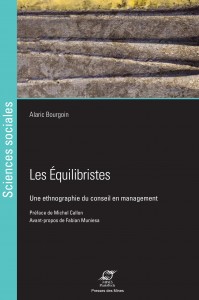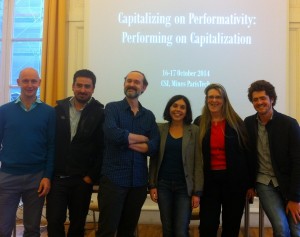With the purpose on keeping the conversation alive, PERFORMABUSINESS (the now officially defunct, but still kicking, project) is starting a new seminar series on “capitalization”. Starting next week, 16 March, with Ivan Ascher! Details here.
Category Archives: PERFORMABUSINESS
Management Consulting, Performativity and the PowerPoint Syndrome
The fact that an interest on the performative condition in and of business needs to translate into an investigation on management consulting has been part of PERFORMABUSINESS since the start of the project. We are happy to communicate that one key deliverable on that front is now out from Management Communication Quarterly‘s OnlineFirst: in “Building a Rock-Solid Slide: Management Consulting, PowerPoint, and the Craft of Signification”, Alaric Bourgoin and Fabian Muniesa tackle this through a semiotic look at the power of PowerPoint. From the abstract:
The diagrammatic slideshow constitutes a crucial communicational instrument in management consulting. However, its semiotic implications remain poorly understood. How do consultants create slides that they deem significant? How do they recognize a good slide or an effective diagram? What practical criteria do they use? To tackle these questions, we develop a pragmatist approach based on the theory of signs of Charles S. Peirce. Drawing from data collected through ethnographic participant observation, our study analyzes how a team of consultants drafts a single slide intended to represent the problems of a client organization and assesses the evolving strength of the document. We identify three recurrent conditions of robustness—impact, accuracy, and layout—and discuss them in the light of Peirce’s distinction of iconic, indexical, and symbolic capacities in signification.
Project Closure and Publication Plan
This month, December 2015, marks the official closure of what has been a 56-months project. What has been done and what is to be left? PERFORMABUSINESS (“Performativity in Business Education, Management Consulting and Entrepreneurial Finance”) has been productive on the publication front. A few books and more than a dozen articles are listed in the project’s dissemination list. But crucial achievements of the publication plan are still underway, besides the much advertised collective book on the problem of capitalization in the midst of the performative condition. This includes forthcoming work on the pedagogy on finance in contemporary business schools, on the history of business valuation, on the semiotics of management consulting and on the anthropology of economics. This blog will still provide snippets of this work in the months to come.
Book Manuscript: Elements for a Social Inquiry into Capitalization
Readers attentive to the PERFORMABUSINESS focus already know that capitalization is at the center of the agenda. “Elements for a Social Inquiry into Capitalization” is the title of book manuscript, currently submitted for publication, co-authored by an expanded project collective (Fabian Muniesa, Liliana Doganova, Horacio Ortiz, Alvaro Pina-Stranger, Florence Paterson, Alaric Bourgoin, Véra Ehrenstein, Pierre-André Juven, David Pontille, Basak Sarac-Lesavre and Guillaume Yon). The book critically examines the meaning of capitalization. It proposes an inquiry into the traits, necessities and upshots of this particular process of valuation in which things become assets and their value is assessed from the viewpoint of an investor. Grounded on a pragmatist attention to practical process, material culture and situated interpretation, the book takes the form of an ethnographic exploration of a number of relevant scenes and sites: situations in which the meaning of capitalization is progressively captured. Through the description of acts of capitalization and the analysis of the narratives they require and the practices they institute, the book articulates a research sensibility that renders capitalization visible and approachable as an anthropological problem. The inquiry signals the centrality of a problematic scenario in which the objects of valuation are capitalized – they become capital – and transformed accordingly.
More on the fate of this key project deliverable soon!
Tightrope Walkers: An Ethnography of Management Consulting

PERFORMABUSINESS is proud to announce the delivery of a major contribution to the understanding of the performative condition of management consultants — tightrope walkers, acrobats of the permanent performance of value.
Les Équilibristes: Une Ethnographie du Conseil en Management is the title of the ethnography of management consulting, now out from the Presses des Mines (Paris), offered by Alaric Bourgoin. With a foreword by Fabian Muniesa and an preface by Michel Callon, available from the publisher here (in French).
A Talk on the Habit of Capitalization
“Setting the habit of capitalization: the pedagogy of earning power at the Harvard Business School, 1920-1940” is the titled of a PERFORMABUSINESS paper currently prepared by Fabian Muniesa in collaboration with Liliana Doganova. From the abstract:
“The quandaries of business valuation have marked the pedagogy of business administration since early attempts at institutionalizing the managerial discipline. It is however now commonly admitted, at least in legitimate financial and entrepreneurial circles, that the value of a business (that is, the monetary assessment of a functioning enterprise established in a competitive environment) resides primarily in its earning power or, in other words, that what a business is worth equals its capacity to generate a stream of revenues for the investor or investors that provide it with funding. How did this idea take shape and how did it permeate the business mind? An examination of early pedagogical materials at the Harvard Business School (an influential reference for the socialization of the businessperson) and, in particular, of the vagaries of the idea of capitalization and its exercising in the classroom, provides a fine occasion to advance understanding of the meaning of such ideals of business and business value, and of their institutionalization. This empirical study can, in turn, be employed in order to discuss and refine our interpretation of what a convention of economic valuation is and how it operates.”
The research is based in part on an examination of archival materials collected from the Cecil E. Fraser Papers, which are located at the Baker Library, Harvard Business School. An audio file from a presentation on the paper is available here from the Max Planck Institute for the Studies of Societies in Cologne, who kindly invited Fabian Muniesa to give a talk in January 2015 (further files from the conference series are available here).
Financial Value and Truth: Some Reviews
Valeur financière et vérité (Presses de Sciences Po, 2014), a major contribution to the political anthropology of financial valuation authored by Horacio Ortiz, has been commented in scholarly reviews and the press: see coverage available from Mediapart, Lectures and Alternatives Economiques.
Performativity, Valuation and Social Sciences in Santiago de Chile
An exciting event on “Cómo las ciencias sociales moldean la realidad que vivimos”, to be held tomorrow, 16 February 2015, in Santiago de Chile (Universidad Alberto Hurtado / Fondecyt), presented by Claudio Ramos, and with the participation of Liliana Doganova (program here, announcement here). And on Monday 19 February 2015, same place, an equally exciting talk by Liliana Doganova on the “Historical sociology of valuation methodologies” (information here).
The Performative and the Capitalistic
On 16 an 17 October 2014 the Centre de Sociologie de l’Innovation hosted an international event with a slightly provocative title: “Capitalizing on Performativity: Performing on Capitalization”. The purpose consisted in gathering together a number of colleagues that have played an inspirational role for PERFORMABUSINESS, a research project directed by Fabian Muniesa and funded through an ERC Starting Grant. What was this supposed to be about, anyway? An ex-post interrogation follows.
[Florence:] Why “Capitalizing on Performativity”?
[Fabian:] Well, we can interpret this title in two ways. One is, tongue-in-cheek, as a cynical pun. Yes, we are in the midst of a regime of competition in research, we need to abide by the rules of “value creation”. The very vocabulary put forward by public funding agencies (ERC, ANR, ESRC, etc.) is cluttered with calls for “capitalization”: a particular repertoire of valuation that asks that all what we do which we consider of value ought to be treated as an “asset”, that is, as something that ought to provide “return” (financial or otherwise, including “impact”, “reputation”, and so forth) and therefore serve an investment rationale. We are obsessed with this, as an object of inquiry in PERFORMABUSINESS – an obsession that can be followed through some recent publications (see here, here, here, here, here or here) and a book in preparation. What is PERFORMABUSINESS but an attempt at capitalizing on the notion of performativity?
[Florence:] Funny. But I hope you had a better reason to invite all these people to give a talk. Did you?
[Fabian:] Yes, sure, there was also a serious reason (although somewhat related). The spirit of the event was about gathering, in a very liberal and catholic way, a number of colleagues whose work and preoccupations have played a role in our thinking. We had the chance to count on Laure Cabantous, Eve Chiapello, Kimberly Chong, Barbara Czarniawska, Daniel Fridman, Martin Giraudeau, Penny Harvey, Sarah Kaplan, Andrew Leyshon, Javier Lezaun, Peter Miller, Paolo Quattrone, Michele Spanò and Signe Vikkelsø. Looking at things from different perspectives (economic anthropology, the philosophy of law, the history of science, organization studies, accounting, etc.), these authors bring contrasted light to the understanding of the practices that constitute the stuff of business. The idea of performativity, quite fuzzy indeed, served as an entry point.
[Florence:] Fuzzy performativity?
[Fabian:] Yes. We start from a loose sense of that notion, which we consider as some sort of an intellectual atmosphere rather than as a technical concept: an atmosphere that is partial to a pragmatist intuition (that of signification as act and reality as effectuation) that may be recognized in innumerable guises. This is the standpoint defended in The Provoked Economy (a recent project “deliverable”, now out with Routledge). That said, we thought that all these works could serve to reestablish in new light the link first formulated by Jean-François Lyotard and then reworked by others (Jon McKenzie for example) between managerial, semiotic and dramaturgical understandings of “performance”. We also thought that we could obtain there the materials that would allow reflecting on the connection between, on the one hand, the performative understood as the very matter of the “postmodern condition” (performativity is for Lyotard the condition of postmodern knowledge) and, on the other, the fact that this matter becomes the object of capitalization (postmodern knowledge is “par excellence” financialized knowledge).
[Florence:] So this means that the idea of “capitalizing on performativity” should be taken seriously, as a way to describe something like the financialization of signification.
[Fabian:] Absolutely, spot on: financialization of signification. Signs are considered, on the one hand, through their performative dimension, and, on the other hand, as the object of capitalistic investment. Most of the talks could actually be interpreted in that perspective. Many dealt with the managerial configuration of organizations, which relies heavily on rhetoric crafts and which also contributes to the transformation of such organizations into financial assets. The pedagogy of finance, we also saw, often requires an intimate transformation of the self through participatory, experiential means, and translates accordingly into the intimate experience of “become capital” oneself. The performative becomes “value creation” in a very financial sense of the term.
[Florence:] And did participants agree with that?
[Fabian:] Hard to tell, but I would tend to say: yes, to quite a large extent – and definitely yes on a telepathic level, since that idea was clearly in the air when we thought about them!
Quick Report on Team Movements
After a remarkable doctoral research at the CSI and post-doctoral contribution to PERFORMABUSINESS, Alaric Bourgoin flew to Canada to join the department of mamangement at HEC Montréal as an assistant professor. Congratulations! Horacio Ortiz recently concluded his 3-years post-doctoral engagement at the CSI, which he spent in Shanghai for PERFORMABUSINESS. He is now an assistant professor at the Research Institute of Anthropology, East China Normal University, Shanghai. Congratulations too!
The full team gathered together at the “Capitalizing on Performativity” event. From left to right: Horacio, Alvaro, Fabian, Liliana, Florence and Alaric.

